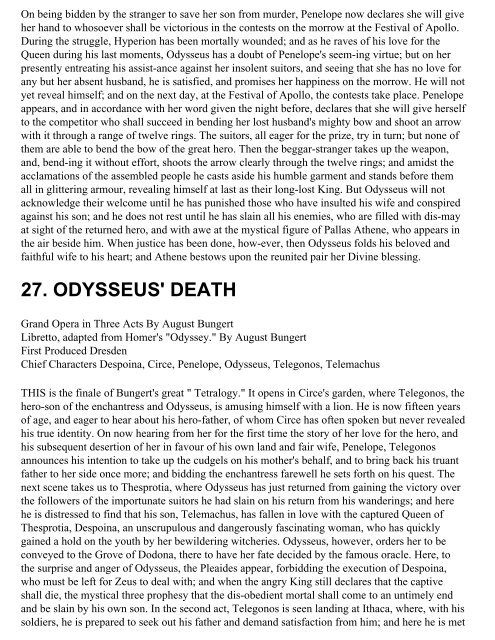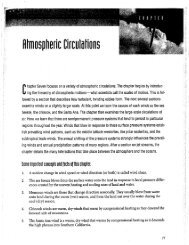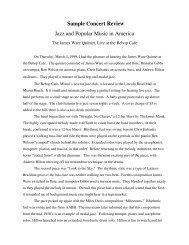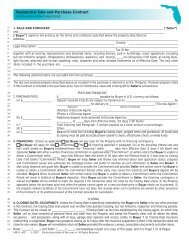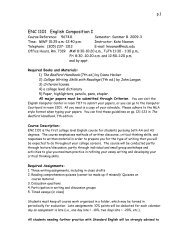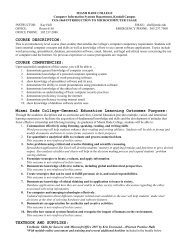Opera Plots I - MDC Faculty Home Pages
Opera Plots I - MDC Faculty Home Pages
Opera Plots I - MDC Faculty Home Pages
Create successful ePaper yourself
Turn your PDF publications into a flip-book with our unique Google optimized e-Paper software.
On being bidden by the stranger to save her son from murder, Penelope now declares she will give<br />
her hand to whosoever shall be victorious in the contests on the morrow at the Festival of Apollo.<br />
During the struggle, Hyperion has been mortally wounded; and as he raves of his love for the<br />
Queen during his last moments, Odysseus has a doubt of Penelope's seem-ing virtue; but on her<br />
presently entreating his assist-ance against her insolent suitors, and seeing that she has no love for<br />
any but her absent husband, he is satisfied, and promises her happiness on the morrow. He will not<br />
yet reveal himself; and on the next day, at the Festival of Apollo, the contests take place. Penelope<br />
appears, and in accordance with her word given the night before, declares that she will give herself<br />
to the competitor who shall succeed in bending her lost husband's mighty bow and shoot an arrow<br />
with it through a range of twelve rings. The suitors, all eager for the prize, try in turn; but none of<br />
them are able to bend the bow of the great hero. Then the beggar-stranger takes up the weapon,<br />
and, bend-ing it without effort, shoots the arrow clearly through the twelve rings; and amidst the<br />
acclamations of the assembled people he casts aside his humble garment and stands before them<br />
all in glittering armour, revealing himself at last as their long-lost King. But Odysseus will not<br />
acknowledge their welcome until he has punished those who have insulted his wife and conspired<br />
against his son; and he does not rest until he has slain all his enemies, who are filled with dis-may<br />
at sight of the returned hero, and with awe at the mystical figure of Pallas Athene, who appears in<br />
the air beside him. When justice has been done, how-ever, then Odysseus folds his beloved and<br />
faithful wife to his heart; and Athene bestows upon the reunited pair her Divine blessing.<br />
27. ODYSSEUS' DEATH<br />
Grand <strong>Opera</strong> in Three Acts By August Bungert<br />
Libretto, adapted from <strong>Home</strong>r's "Odyssey." By August Bungert<br />
First Produced Dresden<br />
Chief Characters Despoina, Circe, Penelope, Odysseus, Telegonos, Telemachus<br />
THIS is the finale of Bungert's great " Tetralogy." It opens in Circe's garden, where Telegonos, the<br />
hero-son of the enchantress and Odysseus, is amusing himself with a lion. He is now fifteen years<br />
of age, and eager to hear about his hero-father, of whom Circe has often spoken but never revealed<br />
his true identity. On now hearing from her for the first time the story of her love for the hero, and<br />
his subsequent desertion of her in favour of his own land and fair wife, Penelope, Telegonos<br />
announces his intention to take up the cudgels on his mother's behalf, and to bring back his truant<br />
father to her side once more; and bidding the enchantress farewell he sets forth on his quest. The<br />
next scene takes us to Thesprotia, where Odysseus has just returned from gaining the victory over<br />
the followers of the importunate suitors he had slain on his return from his wanderings; and here<br />
he is distressed to find that his son, Telemachus, has fallen in love with the captured Queen of<br />
Thesprotia, Despoina, an unscrupulous and dangerously fascinating woman, who has quickly<br />
gained a hold on the youth by her bewildering witcheries. Odysseus, however, orders her to be<br />
conveyed to the Grove of Dodona, there to have her fate decided by the famous oracle. Here, to<br />
the surprise and anger of Odysseus, the Pleaides appear, forbidding the execution of Despoina,<br />
who must be left for Zeus to deal with; and when the angry King still declares that the captive<br />
shall die, the mystical three prophesy that the dis-obedient mortal shall come to an untimely end<br />
and be slain by his own son. In the second act, Telegonos is seen landing at Ithaca, where, with his<br />
soldiers, he is prepared to seek out his father and demand satisfaction from him; and here he is met


